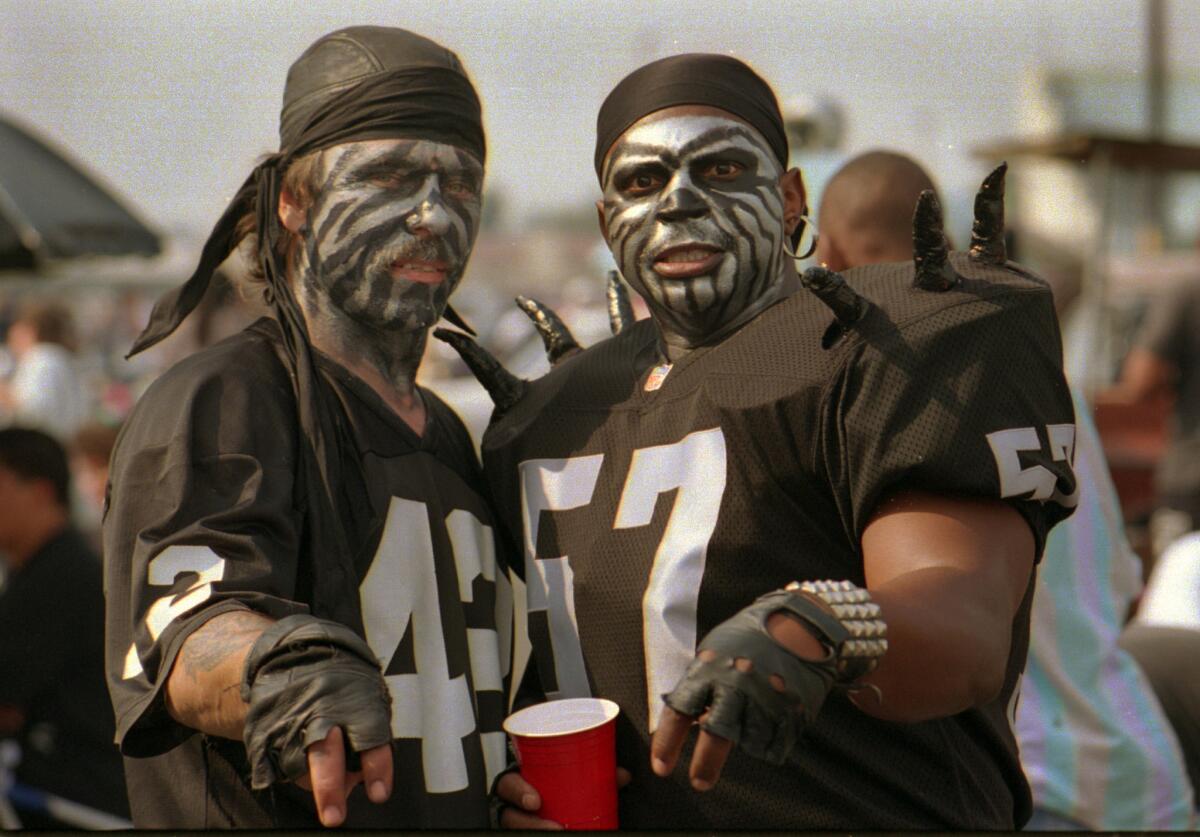NFL team in L.A. would have to win over fans with widespread loyalties

In the two decades since the NFL packed up and moved out, Los Angeles has become a unique sort of football city.
No single team has filled the void left by the Rams and Raiders. Instead, fans have learned to pick and choose their favorites from around the league. Transplants have clung to hometown allegiances.
“It’s like the NFL’s version of the United Nations,” said David Carter, a USC sports business professor who has consulted for several communities eager to lure a franchise to Southern California.
Now, with the owner of the St. Louis Rams unveiling plans to build a stadium in Inglewood, sports business analysts aren’t so sure Los Angeles is ready to give its heart to just one team.
Neither are the fans.
“We haven’t had an NFL team here since I was a kid,” said Sean Luna, a 27-year-old from Santa Clarita. “My brother and I have always rooted for the Packers.”
The Rams or any other newcomer might receive an enthusiastic welcome, but would ultimately need to charm a finicky marketplace.
In other major cities, the networks broadcast all of the local team’s road games and any sold-out home games. In the wide-open Los Angeles market, TV often shows the best matchups of the day from across the league.
Strong ratings suggest that fans here appreciate this luxury. John Lester, another Green Bay Packers fan, says he is content to spend his Sunday afternoons at Soup’s Sports Grill in Woodland Hills where a wall full of flat-screens shows action from across the country.
“Why would L.A. want a team?” he asked.
In a series of studies from the late 1990s through the mid-2000s, consultant Max Muhleman found a high degree of interest in the NFL among Southern Californians.
But his work also showed those widespread team loyalties — andsome wariness about recruiting a franchise from somewhere else — which led Muhleman to characterize Los Angeles as “the most complex market in America” when it comes to football.
That means Sharkeez in Hermosa Beach can show all the games on a given Sunday and count on having customers watching at every television in the place. Bartenders and waitresses come to work in different NFL jerseys to connect with customers and maybe get better tips.
“It definitely helps,” said Breeana Woodward, a Chicago Bears fan who serves as a host and also runs promotions at Sharkeez. “There are fans for every team.”
Researchers say they look to social media for a snapshot of this jumbled landscape.
In Los Angeles County, the most-followed teams on Twitter are the San Francisco 49ers at 10%, the Oakland Raiders at 9% and the Dallas Cowboys at 7%. The numbers are similar in Orange County, but with the San Diego Chargers and Packers in the No. 2 and 3 spots, respectively.
By comparison, in San Diego County the Chargers draw 47% of NFL Twitter followers, with no other team accounting for more than 4.5%.
Greater diversity can foster a different relationship between rivals. As a Seahawks follower who moved here from Seattle at the start of season, Jeff Charlton has noticed the difference.
“It’s kind of cool because you get fans from all over the place,” the 26-year-old said. “You get to know people from the other side.”
Fantasy sports also play a role. Rotisserie leagues give fans a stake in various players around the league and a reason to cheer for touchdowns and field goals in multiple games at once.
And if television isn’t enough, diehards can get their game-day experiences on Saturday afternoons with USC and UCLA, two-big time college programs that play at fields just 15 minutes’ drive from one another.
“L.A. evolved into this,” said Marc Ganis of Sportscorp Ltd., a Chicago-based consulting firm. “The evolution began when the Rams and Raiders left.”
All these years later, the NFL’s popularity might still translate into a two- or three-year honeymoon for any franchise that moves here. Muhleman said of fans: “If you build it, they will come.” But the long-term challenges could be significant.
Television ratings could drop over time, taking a bite out of the league’s advertising revenue. The new team in town would have to fight for a slice of the market.
“Whichever team moves to Los Angeles will need to conduct some thorough market research to understand which fans are passionate about their current team and will be difficult to convert, and which fans are casual and therefore more likely to convert,” said Julie Frank, a spokeswoman for Navigate, a national research firm.
Carter goes a step further, suggesting a new franchise would need to market itself in a way that is “so L.A.,” making the stadium a place to see and be seen.
“It’s not just about showing up, tailgating and heading inside,” said the executive director of USC’s Sports Business Institute. “It has to seem like a Hollywood event.”
Winning tends to solve a lot of problems, but top-notch franchises rarely change cities.
“Almost by definition, a team trying to relocate is an unsuccessful team,” Ganis said. “You’re not going to have the New England Patriots move to L.A. You’re not going to get the Pittsburgh Steelers.”
So far, Rams owner Stan Kroenke has not committed to bringing his franchise — or any other — to the proposed stadium beside the Forum.
Regardless, the prospect of the NFL returning to Los Angeles doesn’t excite Luna, who insists he would stick with the team that he and his brother chose as kids.
As for buying a ticket to watch football in Los Angeles, he said: “I’d only care if the Packers come here to play them. I would go to that game.”
Follow David Wharton on Twitter @LATimesWharton
Poll: Which NFL team would you want to see play in Los Angeles?
More to Read
Go beyond the scoreboard
Get the latest on L.A.'s teams in the daily Sports Report newsletter.
You may occasionally receive promotional content from the Los Angeles Times.











